人教版必修1 Unit 1 Friendship-Grammar直接引语与间接引语课件(共25张PPT)
文档属性
| 名称 | 人教版必修1 Unit 1 Friendship-Grammar直接引语与间接引语课件(共25张PPT) | 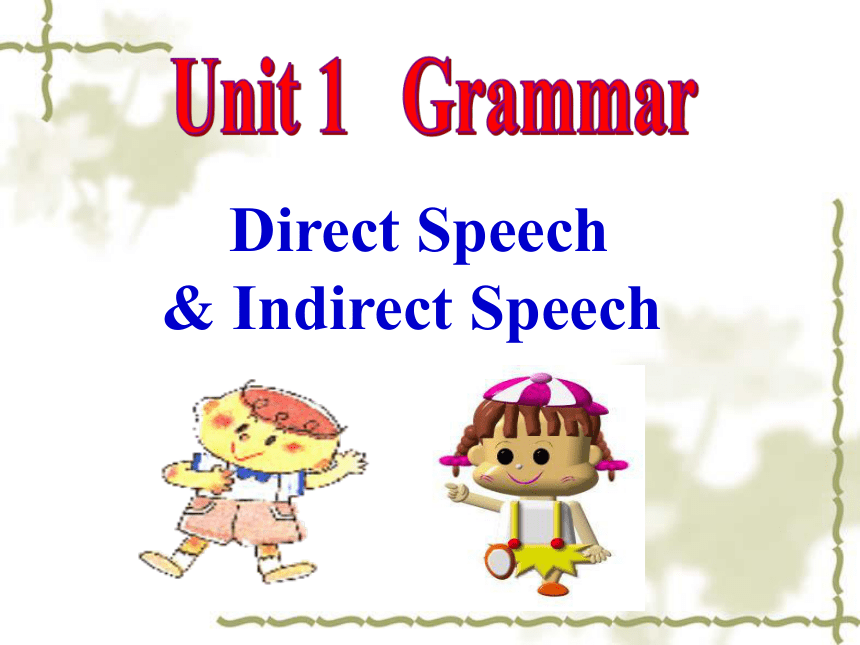 | |
| 格式 | zip | ||
| 文件大小 | 706.7KB | ||
| 资源类型 | 教案 | ||
| 版本资源 | 人教版(新课程标准) | ||
| 科目 | 英语 | ||
| 更新时间 | 2019-08-23 16:15:58 | ||
图片预览

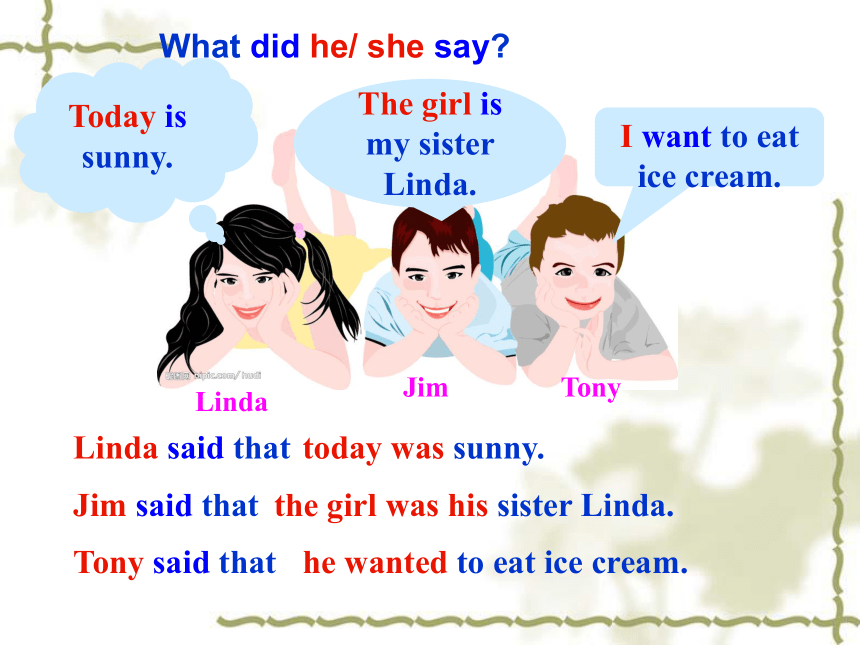

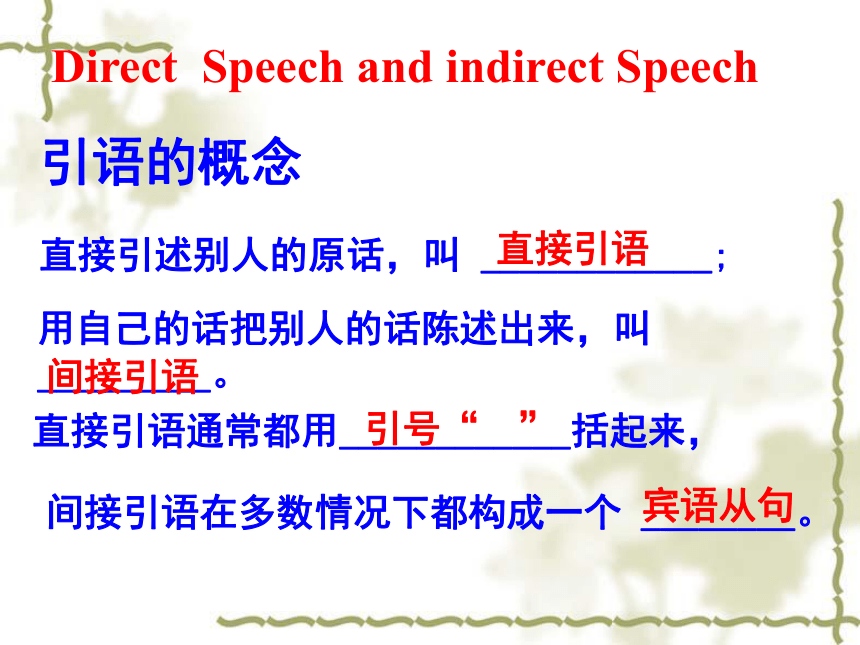
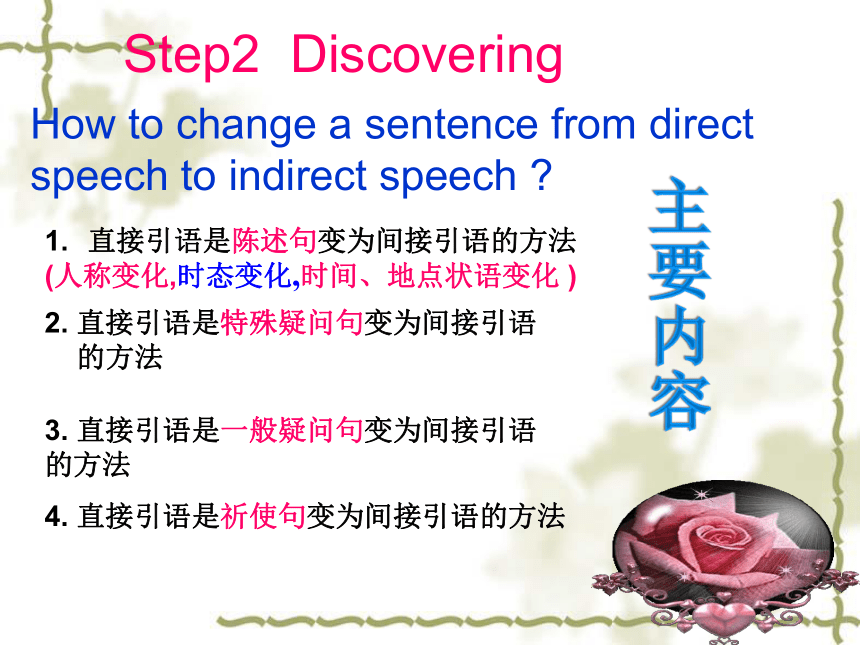
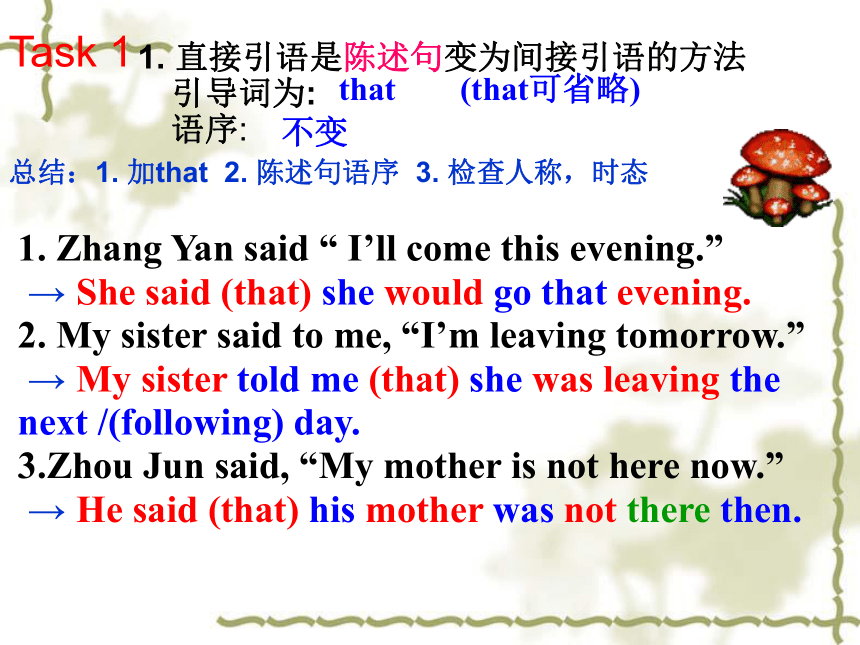
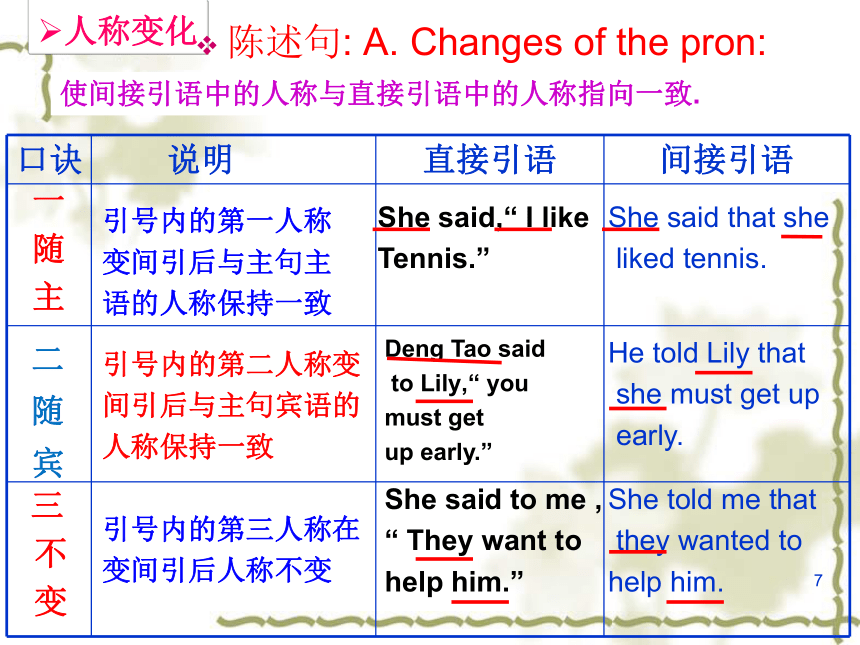
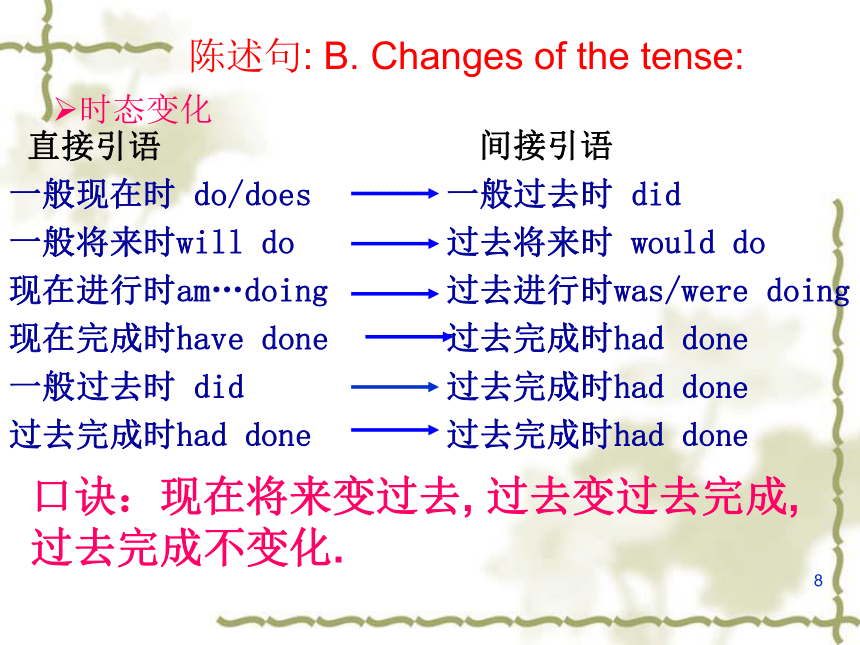
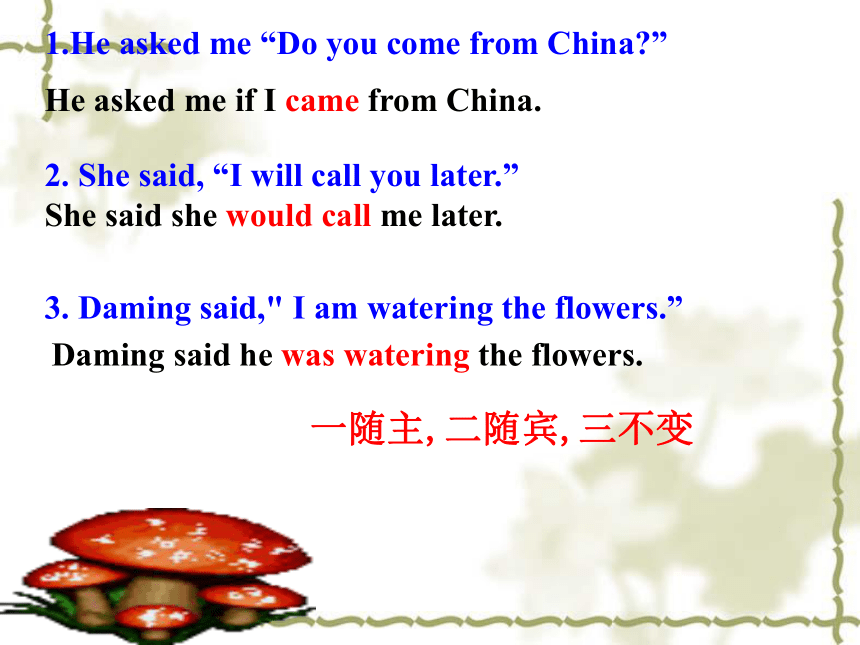
文档简介
(共25张PPT)
Unit 1 Grammar
Direct Speech
& Indirect Speech
What did he/ she say?
The girl is my sister Linda.
Today is sunny.
I want to eat ice cream.
Linda
Jim
Tony
Linda said that
Jim said that
Tony said that
today was sunny.
the girl was his sister Linda.
he wanted to eat ice cream.
Step1 Lead-in
“ I don’t want to set down a series of facts in a diary,” said Anne.
Anne said that she didn’t want to set down a series of facts in a diary.
“ Does a friend always have to be a person?” the writer asks us.
The writer asked us if a friend always had to be a person.
Can you point out Direct Speech(直接引语) and Indirect Speech(间接引语) ?
Direct Speech
Direct Speech
Indirect Speech
Indirect Speech
Direct Speech and indirect Speech
引语的概念
直接引述别人的原话,叫 ____________;
直接引语
用自己的话把别人的话陈述出来,叫 _________。
间接引语
直接引语通常都用____________括起来,
引号“ ”
间接引语在多数情况下都构成一个 ________。
宾语从句
Step2 Discovering
How to change a sentence from direct speech to indirect speech ?
直接引语是陈述句变为间接引语的方法
(人称变化,时态变化,时间、地点状语变化 )
2. 直接引语是特殊疑问句变为间接引语的方法
3. 直接引语是一般疑问句变为间接引语
的方法
4. 直接引语是祈使句变为间接引语的方法
主要内容
1. Zhang Yan said “ I’ll come this evening.”
→ She said (that) she would go that evening.
2. My sister said to me, “I’m leaving tomorrow.”
→ My sister told me (that) she was leaving the next /(following) day.
3.Zhou Jun said, “My mother is not here now.”
→ He said (that) his mother was not there then.
1. 直接引语是陈述句变为间接引语的方法
引导词为:
语序:
that
不变
(that可省略)
Task 1
总结:1. 加that 2. 陈述句语序 3. 检查人称,时态
7
口诀 说明 直接引语 间接引语
人称变化
一
随
主
二 随 宾
三
不
变
引号内的第一人称
变间引后与主句主
语的人称保持一致
引号内的第二人称变间引后与主句宾语的人称保持一致
引号内的第三人称在变间引后人称不变
She said,“ I like
Tennis.”
She said that she
liked tennis.
Deng Tao said
to Lily,“ you
must get
up early.”
He told Lily that
she must get up
early.
She said to me ,
“ They want to
help him.”
She told me that
they wanted to
help him.
使间接引语中的人称与直接引语中的人称指向一致.
陈述句: A. Changes of the pron:
8
时态变化
直接引语
一般现在时 do/does
一般将来时will do
现在进行时am…doing
现在完成时have done
一般过去时 did
过去完成时had done
间接引语
一般过去时 did
过去将来时 would do
过去进行时was/were doing
过去完成时had done
过去完成时had done
过去完成时had done
口诀:现在将来变过去, 过去变过去完成, 过去完成不变化.
陈述句: B. Changes of the tense:
1.He asked me “Do you come from China?”
2. She said, “I will call you later.”
3. Daming said," I am watering the flowers.”
He asked me if I came from China.
She said she would call me later.
Daming said he was watering the flowers.
一随主,二随宾,三不变
注意:以下几种情况时态 不变
①直接引语是客观真理。
The?teacher said "The?earth?moves?around?the?sun?.”
→?The?teacher?said?(that)?the?earth?moves?around?
the?sun?earth.
③直接引语中有具体的过去某年、某月、某日作状语,
变为间接引语时,时态不变。如:
Lei Miao?said?"I?was?born?on??December?11,?1999."?
②直接引语是过去进行时,时态不变。
Yang Long?said?“I was doing chores when Tom came to see me.”
→ Yang Long said he was doing chores when Tom had come to see him.
→Lei Miao said?she?was?born?on?December?11,?1999.
④直接引语如果是一般现在时。表示一种反复出现或习惯性的动作,变间接引语,时态不变。如:
Wen Hui?said,?“I?get?up?at?six?every?morning。”?
⑤如果直接引语中的情态动词没有过去时的形式,时态不再变(例:could,?should,?would,?might)
The doctor said to me, “You should stay in bed for 2 days.”
→ The doctor said to me I should stay in bed for 2 days.”
或已经是过去时的形式时,时态不再变。
(例: ought?to,?had?better,?used?to)
Dang Ran?said to me.?"You?had?better?come?here?today."?
→She?said?(that) she?gets?up?at?six?every?morning.
→ Dang Ran?said to me (that)?I?had?better?go?there
?that?day.
直接引语
间接引语
指示代词
时 间 状 语
地点状语
方向性动词
this,
that,
these
those
now,
then,
today
that day
this week
that week
yesterday
the day before
last week
the week before
four days ago
four days before
the day before yesterday
two days before
tomorrow
the next/following day
next month
the next/following month
here
there
come,
go,
bring
take
情态动词
can, may, must
could, might, had to
陈述句: C. Changes of adverbials , verbs and so on:
Wang Jing asked Zhang Fen, “what do you do every morning?”
Wang Jing asked Zhang Fen
what he did
every morning.
2. 直接引语是特殊疑问句变为间接引语的方法
引导词为:
语序:
“What do you want?” he asked me.
→ He asked me what I wanted.
2. The teacher asked me, “Why do you want to do
that?”
→ The teacher asked me why I wanted to do that.
3. She asked me, “Where have you been?”
→ She asked me where I had been.
特殊疑问词wh-
陈述语序(即主语在前,谓语在后)
Task 2
总结:1. 加特殊疑问词 2. 陈述句语序 3. 检查人称,时态
一随主,二随宾,三不变
1. He asked me, “Are you interested in it?”
→ He asked (me) if/whether I was interested in it.
2. He asked me, “Do you like this film?”
→ He asked if/whether I liked that film.
3. 直接引语是一般疑问句变为间接引语的方法
引导词为:
语序:
if 或 whether
陈述(即主语在前,谓语在后)
Task 3
总结:1. 加if /whether 2. 陈述句语序 3. 检查人称,时态
Look out of the traffic.
The police asked the students
Thank you!
Students thanked the police.
to look out of the traffic.
祈使句
4. 直接引语是祈使句变为间接引语的方法
间接引语应改为
“tell (ask, order等) sb (not) to do sth.”句型。
She said to the children , “ Don’t talk.”
→ She asked the children
She said, “Be quiet.”
→ She asked me
to be quiet.
not to talk.
Task 4
Li Yingchun said, “I like English.”
Li Yingchun asked me ,“Do you like English?”
Li Yingchun said to me, “what do you like ?”
Zhong Guoxin said to me, “Open the door.”
Li Yingchun said that she liked English.”
Li Yingchun asked me if/whether I liked
English.
Li Yingchun asked me what I liked .
Zhong Guoxin asked me to open the door.
陈述句,特殊、一般疑问句,祈使句由直接
引语变为间接引语的区别
Step3 Summary
Step3 Summary
性质:间接引语在多数情况下是一个宾语从句
人称:一随主,二随宾,三不变
时态:主句为一般过去时态,从句相应的变化
引导词:
陈述句: 用that
一般疑问句: 用if或whether
特殊疑问句: 用特殊疑问词
祈使句: tell sb. to do s.th
ask sb. to do s.th
order sb. to do s.th
1. “I never eat meat.” he said.
He said that never meat.
2. The teacher said, “The sun rises in the east and goes down in the west.”
The teacher said that the sun in the east and _____ down in the west.
3. “I meet her here.” he told me.
He me that he her .
4. He said to Jim, “You can sit here, Jim.”
He Jim that he sit there.
5. He asked her mother , “How do you find it, mother?”
He asked her mother it.
he
ate
rises
goes
told
met
there
told
could
how
she
found
Step4 Practice
1 The reporter said that the UFO ______ east to west when he saw it. (NMET 2000)
A.was travelling
B.travelled
C.had been traveling
D.was to travel
高考链接
2 I wonder why Jenny ______ us
recently.We should have heard
from her by now.(NMET 2002)
A.hasn't written??
B.doesn't write
C.won't write?????
D.hadn't written
3 Choosing the right dictionary
depends on ______ you want to use
it for. (2007)
A. what B. why
C. how D. whether
1. “Where is she from?”
2. “How old are they?”
3. “What’s the weather like today?”
4. “How do you go to school?”
5. “Who is singing?”
6. “When do you get up?” He wanted to know __________________
7. “Where do you go now?” he asked.
He asked me ___________________________.
8. “Do you know where she lives?” he asked.
He asked knew where she .
9. “Stop making so much noise, children.” he said.
He _____________________ the children making so much noise.
10. “Don’t tell him the news.” she said.
She told me _______________________.
11. “Are you interested in this?” he said.
He asked _________________________.
Homework
Change the following sentence from Direct Speech
to Indirect Speech.
Thank you!
Unit 1 Grammar
Direct Speech
& Indirect Speech
What did he/ she say?
The girl is my sister Linda.
Today is sunny.
I want to eat ice cream.
Linda
Jim
Tony
Linda said that
Jim said that
Tony said that
today was sunny.
the girl was his sister Linda.
he wanted to eat ice cream.
Step1 Lead-in
“ I don’t want to set down a series of facts in a diary,” said Anne.
Anne said that she didn’t want to set down a series of facts in a diary.
“ Does a friend always have to be a person?” the writer asks us.
The writer asked us if a friend always had to be a person.
Can you point out Direct Speech(直接引语) and Indirect Speech(间接引语) ?
Direct Speech
Direct Speech
Indirect Speech
Indirect Speech
Direct Speech and indirect Speech
引语的概念
直接引述别人的原话,叫 ____________;
直接引语
用自己的话把别人的话陈述出来,叫 _________。
间接引语
直接引语通常都用____________括起来,
引号“ ”
间接引语在多数情况下都构成一个 ________。
宾语从句
Step2 Discovering
How to change a sentence from direct speech to indirect speech ?
直接引语是陈述句变为间接引语的方法
(人称变化,时态变化,时间、地点状语变化 )
2. 直接引语是特殊疑问句变为间接引语的方法
3. 直接引语是一般疑问句变为间接引语
的方法
4. 直接引语是祈使句变为间接引语的方法
主要内容
1. Zhang Yan said “ I’ll come this evening.”
→ She said (that) she would go that evening.
2. My sister said to me, “I’m leaving tomorrow.”
→ My sister told me (that) she was leaving the next /(following) day.
3.Zhou Jun said, “My mother is not here now.”
→ He said (that) his mother was not there then.
1. 直接引语是陈述句变为间接引语的方法
引导词为:
语序:
that
不变
(that可省略)
Task 1
总结:1. 加that 2. 陈述句语序 3. 检查人称,时态
7
口诀 说明 直接引语 间接引语
人称变化
一
随
主
二 随 宾
三
不
变
引号内的第一人称
变间引后与主句主
语的人称保持一致
引号内的第二人称变间引后与主句宾语的人称保持一致
引号内的第三人称在变间引后人称不变
She said,“ I like
Tennis.”
She said that she
liked tennis.
Deng Tao said
to Lily,“ you
must get
up early.”
He told Lily that
she must get up
early.
She said to me ,
“ They want to
help him.”
She told me that
they wanted to
help him.
使间接引语中的人称与直接引语中的人称指向一致.
陈述句: A. Changes of the pron:
8
时态变化
直接引语
一般现在时 do/does
一般将来时will do
现在进行时am…doing
现在完成时have done
一般过去时 did
过去完成时had done
间接引语
一般过去时 did
过去将来时 would do
过去进行时was/were doing
过去完成时had done
过去完成时had done
过去完成时had done
口诀:现在将来变过去, 过去变过去完成, 过去完成不变化.
陈述句: B. Changes of the tense:
1.He asked me “Do you come from China?”
2. She said, “I will call you later.”
3. Daming said," I am watering the flowers.”
He asked me if I came from China.
She said she would call me later.
Daming said he was watering the flowers.
一随主,二随宾,三不变
注意:以下几种情况时态 不变
①直接引语是客观真理。
The?teacher said "The?earth?moves?around?the?sun?.”
→?The?teacher?said?(that)?the?earth?moves?around?
the?sun?earth.
③直接引语中有具体的过去某年、某月、某日作状语,
变为间接引语时,时态不变。如:
Lei Miao?said?"I?was?born?on??December?11,?1999."?
②直接引语是过去进行时,时态不变。
Yang Long?said?“I was doing chores when Tom came to see me.”
→ Yang Long said he was doing chores when Tom had come to see him.
→Lei Miao said?she?was?born?on?December?11,?1999.
④直接引语如果是一般现在时。表示一种反复出现或习惯性的动作,变间接引语,时态不变。如:
Wen Hui?said,?“I?get?up?at?six?every?morning。”?
⑤如果直接引语中的情态动词没有过去时的形式,时态不再变(例:could,?should,?would,?might)
The doctor said to me, “You should stay in bed for 2 days.”
→ The doctor said to me I should stay in bed for 2 days.”
或已经是过去时的形式时,时态不再变。
(例: ought?to,?had?better,?used?to)
Dang Ran?said to me.?"You?had?better?come?here?today."?
→She?said?(that) she?gets?up?at?six?every?morning.
→ Dang Ran?said to me (that)?I?had?better?go?there
?that?day.
直接引语
间接引语
指示代词
时 间 状 语
地点状语
方向性动词
this,
that,
these
those
now,
then,
today
that day
this week
that week
yesterday
the day before
last week
the week before
four days ago
four days before
the day before yesterday
two days before
tomorrow
the next/following day
next month
the next/following month
here
there
come,
go,
bring
take
情态动词
can, may, must
could, might, had to
陈述句: C. Changes of adverbials , verbs and so on:
Wang Jing asked Zhang Fen, “what do you do every morning?”
Wang Jing asked Zhang Fen
what he did
every morning.
2. 直接引语是特殊疑问句变为间接引语的方法
引导词为:
语序:
“What do you want?” he asked me.
→ He asked me what I wanted.
2. The teacher asked me, “Why do you want to do
that?”
→ The teacher asked me why I wanted to do that.
3. She asked me, “Where have you been?”
→ She asked me where I had been.
特殊疑问词wh-
陈述语序(即主语在前,谓语在后)
Task 2
总结:1. 加特殊疑问词 2. 陈述句语序 3. 检查人称,时态
一随主,二随宾,三不变
1. He asked me, “Are you interested in it?”
→ He asked (me) if/whether I was interested in it.
2. He asked me, “Do you like this film?”
→ He asked if/whether I liked that film.
3. 直接引语是一般疑问句变为间接引语的方法
引导词为:
语序:
if 或 whether
陈述(即主语在前,谓语在后)
Task 3
总结:1. 加if /whether 2. 陈述句语序 3. 检查人称,时态
Look out of the traffic.
The police asked the students
Thank you!
Students thanked the police.
to look out of the traffic.
祈使句
4. 直接引语是祈使句变为间接引语的方法
间接引语应改为
“tell (ask, order等) sb (not) to do sth.”句型。
She said to the children , “ Don’t talk.”
→ She asked the children
She said, “Be quiet.”
→ She asked me
to be quiet.
not to talk.
Task 4
Li Yingchun said, “I like English.”
Li Yingchun asked me ,“Do you like English?”
Li Yingchun said to me, “what do you like ?”
Zhong Guoxin said to me, “Open the door.”
Li Yingchun said that she liked English.”
Li Yingchun asked me if/whether I liked
English.
Li Yingchun asked me what I liked .
Zhong Guoxin asked me to open the door.
陈述句,特殊、一般疑问句,祈使句由直接
引语变为间接引语的区别
Step3 Summary
Step3 Summary
性质:间接引语在多数情况下是一个宾语从句
人称:一随主,二随宾,三不变
时态:主句为一般过去时态,从句相应的变化
引导词:
陈述句: 用that
一般疑问句: 用if或whether
特殊疑问句: 用特殊疑问词
祈使句: tell sb. to do s.th
ask sb. to do s.th
order sb. to do s.th
1. “I never eat meat.” he said.
He said that never meat.
2. The teacher said, “The sun rises in the east and goes down in the west.”
The teacher said that the sun in the east and _____ down in the west.
3. “I meet her here.” he told me.
He me that he her .
4. He said to Jim, “You can sit here, Jim.”
He Jim that he sit there.
5. He asked her mother , “How do you find it, mother?”
He asked her mother it.
he
ate
rises
goes
told
met
there
told
could
how
she
found
Step4 Practice
1 The reporter said that the UFO ______ east to west when he saw it. (NMET 2000)
A.was travelling
B.travelled
C.had been traveling
D.was to travel
高考链接
2 I wonder why Jenny ______ us
recently.We should have heard
from her by now.(NMET 2002)
A.hasn't written??
B.doesn't write
C.won't write?????
D.hadn't written
3 Choosing the right dictionary
depends on ______ you want to use
it for. (2007)
A. what B. why
C. how D. whether
1. “Where is she from?”
2. “How old are they?”
3. “What’s the weather like today?”
4. “How do you go to school?”
5. “Who is singing?”
6. “When do you get up?” He wanted to know __________________
7. “Where do you go now?” he asked.
He asked me ___________________________.
8. “Do you know where she lives?” he asked.
He asked knew where she .
9. “Stop making so much noise, children.” he said.
He _____________________ the children making so much noise.
10. “Don’t tell him the news.” she said.
She told me _______________________.
11. “Are you interested in this?” he said.
He asked _________________________.
Homework
Change the following sentence from Direct Speech
to Indirect Speech.
Thank you!
